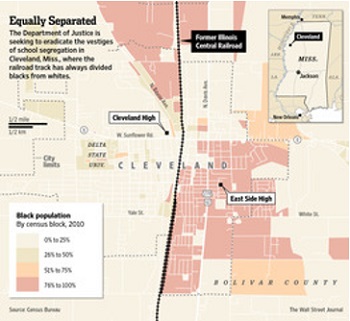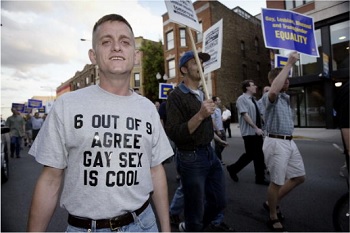5 Unspeakably Bad Historical Practices That Never Went Away

With the current administration, America may have regressed several decades, but we're still doing OK overall. We got rid of slavery, witch hunts, and those stupid wig things from revolutionary times. One day, we may even tackle universal health care and reality TV. Or we could hurriedly slap a new coat of paint on an old atrocity and carry on like nothing's changed. Like so:
Debtors' Prisons Are Still Going Strong
The phrase "debtors' prison" conjures images of Dickensian squalor, colonial indenture, and orphans continuously begging for more despite the fact that you just ate, you little dick, give it time to settle. Time was, if you couldn't pay what you owed, you went to a debtor's prison and stayed there until you'd labored your debt away or had a rich uncle die or something. Now cut to modern America. Debtors' prisons have returned with a vengeance -- they've only changed the way they operate. For the worse.

Turns out that state and local courts can handily supplement their budgets by smacking poor defendants with more hidden fees than your local Wells Fargo. They obviously abuse this ability, because humanity's chief strength is finding new ways to be awful. It is now, in effect, a crime to be poor. Here's how it works: Take a criminal mastermind who's guilty of heinous violations like "parking tickets" and "lapsed car registrations" -- fees the defendants were unable to pay because they were too poor in the first place. Now proceed to throw these poor people in jail for not having enough money. Then slap them with a bunch of fees and charges for having inconvenienced the state by taking up so much valuable jail space. Cue a never-ending circle of financial hell until the day they die.
If that system sounds ridiculous, so do the fees that they use. There are at least 20 different fees a court can punch you with. In places like Oklahoma, the number goes up to a ridiculous 66, including (but far from limited to) "sheriff's fee or pursuing fugitive from justice," "courthouse security fee," and a fee for applying for a freaking public defender.

This is not a tiny handful of petty criminals stuck in some bureaucratic nightmare, either. In Rhode Island alone, 18 people a day are thrown into the modern equivalent of debtors' prison for failure to pay fines. And to ensure that the poor can't mooch a 50 off their cousin to stay out of prison, these aren't nickel-and-dime fees. Even the most basic mandatory ones like "victim penalty assessment" ($500) and "DNA database fee" ($100) will leave you hundreds of dollars in the red. The average legal financial obligations slapped on a defendant is a ridiculous $2,540, in a day and age when most Americans couldn't cobble together $400 in a crisis. Oh, and the annual interest rate is 12 percent. That's like shitty credit predatory car loan interest.
As a result, some defendants have racked up as much as $170,000 in court costs, though it's years since they committed anything even mildly resembling a criminal offense. We're not saying they didn't do anything wrong -- pocketing a Snickers bar or parking in a 7 a.m. - 7 p.m. zone when you're clearly in the 10 a.m. - 12 a.m. window might not be a huge, destabilizing blow to the nation's power structure, but it's still illegal. But we can't help but feel that you shouldn't have to take out a small business loan just to cover the debts you incur as a result of a half-minute of poor decision-making. That's what grad school is for.
Segregation In Schools Didn't End Until 2016 -- And They're Still Fighting For It
Ask any high school student about segregation, and they'll tell you it was institutionally sanctioned racism -- "separate but equal." Was. Everybody knows it's over ...
In the north.
Ask that same question in a place like Mississippi, and the answer might be different. Because the last time a judge had to bitch-slap a Mississippi school over blatant racial segregation was in May of freaking 2016. In many places, the end of segregation was gently encouraged by the presence of the National Guard. However, they couldn't be everywhere at the same time. The school district of Cleveland, Mississippi looked around, saw no National Guard troops, and figured "We'll ride this racism thing to the end of the line. See where it goes."

African American families in Cleveland have spent over five decades duking it out with the school district in the courts. But it wasn't until 2016 that the case reached a federal judge, who promptly told the district they had to desegregate thanks to the ruling in The People v. Seriously? Come On. At this point, the school figured they'd had a good run with this whole intolerance deal, but it was time to throw in the- oh wait, no, they're totally appealing that shit.
The school board's argument for continued segregation is that the second they integrate their school system, white parents will yank their kids out of public education, send them to private schools, and the public schools will all fall into disrepair as a result. However, as a counterpoint, preemptive racism is not a defense enshrined in the U.S. Constitution, whereas equal protection under the law ... is.
Sweatshops Still Operate All Across America
Sweatshop labor isn't restricted to Asia. It's a worldwide problem, operating in exotic locales like ... Los Angeles?

In 2015, the California Department of Labor crunched the numbers and found out that the average cost of a shirt manufactured in the state was about $1.90. Which was all fine and dandy, if it wasn't for the fact a shirt should cost the clothing manufacturers about $9 to make, and that's assuming they're only paying their workers minimum wage. The L.A. Garment Worker Center thinks the industry is rife with health, safety, and payment violations, even outright sweatshop conditions, ranging from a lack of drinking water and proper bathrooms to the workers getting locked in their deathtrap factories with no way out.
Here's a series of testimonials from Hispanic workers about the conditions they faced working for various L.A. sweatshops that make clothes for Forever 21:
12-hour workdays on a salary of less than $200 per week. Rat-and-roach-infested work spaces. Blatant lies from the employers. You know, the American dream!
In 1999, a Mother Jones article by the same guy who wrote Zero Dark Thirty revealed that in Kentucky, an Appalachian sweatshop workforce of 15,000 was manufacturing military clothing on the cheap, in working conditions equally appalling to those of their Californian compatriots.
Made in USA is a great idea, but in reality, all it means is that you're keeping sweatshop money local.
Current Voter ID Laws Are Worse Than Old Poll Taxes
This last election was rife with news stories about voter ID laws. Essentially, a bunch of states recently started passing laws mandating that some folks (generally minorities) show valid forms of photo ID before they'd be allowed to vote, in order to combat fraud at the polls.
How is that bad?
It sounds like a common-sense response to a very real threat. Back in the day, they made it really difficult for minorities to vote -- like the poll tax, the prerequisite voting payment straight from the heyday of Jim Crow, specifically aimed to mess with poor black voters.

But modern voter ID laws are worse. When adjusted for inflation, they literally cost more than poll taxes did. With the poll taxes, you slapped a bunch of money on the table and that was that. Voter IDs may be technically free, but in practice, they eat away both your money and your time. You have to find out what the ID requirements are and how to meet them. You have to purchase the required birth, marriage, naturalization, etc. certificates, and deal with the possible fees from legal help you might need in acquiring those. You need to travel to the necessary agencies, wait in the necessary lines. And, worst of all, you need to acquire a semi-presentable photo of yourself that isn't a Facebook photo of you on a toilet drunkenly eating ramen. All of this can cost you anything from $75 from to $1,500. Hey, guess how much the poll tax was when it was outlawed in 1964? $1.50.

Unsurprisingly, minority groups and low-income voters are the ones voter ID laws hit hardest. And the fun thing is that said laws are little more than smoke and mirrors. Statistically speaking, voter fraud is a virtually nonexistent problem, with only a minuscule handful of cases turning out to be real. Basically, voter ID laws are preventing something that hardly ever happens while disenfranchising minorities more effectively than poll taxes ever could. That's like worrying that someone might be struck by lightning while driving to the beach, so you outlaw the beach.
Anti-Sodomy Laws Are Still Going Strong (Despite Being Unconstitutional)
We've already covered the 2003 Lawrence v. Texas case, which struck down discriminating anti-sodomy laws and ushered in a new era of equality for gay people in this country. But the defendant in that case never actually repealed the law that the Supreme Court struck down. Texas happily kept its anti-sodomy law on the books as a "Fuck You" to the progressive agenda, which consists of "stop screwing people over, thanks." To this day, a total of 12 states still have anti-sodomy laws on the books. But still, it's not like they're used, right? Even at the time it was being argued, Texas' anti-sodomy statute was just a rarely enforced, antiquated middle finger to the ghost of Harvey Milk.
Now, Louisiana, on the other hand ...

Police officers in Louisiana are still absolutely arresting gay men under the aegis of anti-sodomy statutes. Sure, the arrests are futile, because the laws are unconstitutional and thus absolutely toothless. However, this has done little to curb the cops' enthusiasm, and the effect can be devastating to the gay community. It's not a flub by cops who aren't aware of the anti-sodomy laws' declawed status, either. Between 2003 and 2013, the police even conducted a "sting operation" to root out casual gay sex. To be clear, this wasn't like a narcotic sting that used antiquated laws as false pretext for search and seizure. The sting actively targeted gay men who were having consensual sex and arrested them for the rough legal equivalent of "shits and giggles." The stings may be over, but individual anti-sodomy arrests still take place, and similar harassment arrests have been known to happen all the way up to North Carolina. The good Carolina! Wait, is it? Or is South Carolina the good one? Double-wait: Is there a good Carolina, or are we thinking of Korea?
J.C. Breen lives and works in New York City. If you dig his writing here, be sure and go to his website and keep reading until you find something of his you don't like.
Think Nana and Pop-Pop's loving 60-year monogamous relationship is quaint and old-fashioned? First off, sorry for that disturbing image, but we've got some news for you: the monogamous sexual relationship is actually brand new relative to how long humans have been around. Secondly, it's about to get worse from here: monkey sex.
On this month's live podcast, Jack O'Brien and the Cracked staff welcome Dr. Christopher Ryan, podcaster and author of 'Sex at Dawn', onto the show for a lively Valentine's Day discussion about love, sex, why our genitals are where they are, and why we're more like chimps and bonobos than you think.
Get your tickets here:
For more backward things still going strong in this country, check out 5 Insane Laws Written Specifically To Harass Poor People and 22 Insane Laws You Won't Believe Exist In The Modern World.
Subscribe to our YouTube channel, and check out A Brief History Of Donald Trump's Many, Many, Many Lawsuits, and other videos you won't see on the site!
Follow us on Facebook, and we'll follow you everywhere.